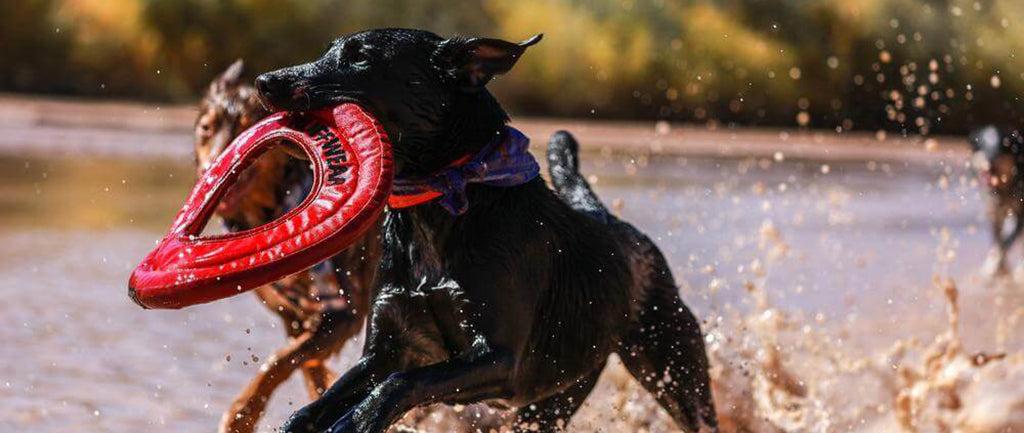Summary: There are so many different types of dog toys! When it comes to choosing, learn what you need to think about like their age, teeth condition, and ability… One of the most fun parts about being a pet parent to a pup is being able to play with them, and choosing the […]
Choosing The Right Types Of Dog Toys

Summary: There are so many different types of dog toys! When it comes to choosing, learn what you need to think about like their age, teeth condition, and ability…
One of the most fun parts about being a pet parent to a pup is being able to play with them, and choosing the right toys for your furry friend is incredibly important!
Toys play a huge part in looking after your dog’s happiness and well-being. Toys ensure they’re staying active, both physically and mentally. But, how do you know if you’re choosing the right ones for them?
There are a few things you should keep in mind when you’re next browsing the dog toy aisle with an array of different types of dog toys on offer…
Your Dog’s Age
While dogs don’t mature in the same way we do, you should still keep your dog’s age in mind. Young pups who still have their baby teeth need softer toys, so one with softer rubber or fabrics are the best when it comes to choosing the right types of dog toys for them. When your puppy gets to around three to nine months, they will begin teething so it’s best to avoid hard rubber and stock up on softer, cheaper toys, as they’ll be chewing a lot! Making sure there are enough toys around to chew on will keep them distracted and stop them from chewing on your favorite shoes or expensive furniture!
Once the teething phase is over, your dog will have a strong enough jaw to play and chew on harder toys and bundles of energy to play with everything from balls to rope pulls so you can upgrade your types of dog toys at this point.
As your dog reaches 7 years of age, however, they won’t have the same jaw strength they once did, so while it’s still important to provide chewing toys it’s best to avoid tough, harder ones.
Ensuring your slightly older dog is active is very important, as keeping your dog active will keep them young, both mentally, and physically and reduce stress from excess weight on their maturing joints and bones!

Your Dog’s Jaw Size
The breed of dog you own will also largely affect how well your dog can chew, as a small Yorkshire Terrier is not going to be able to chew as well as a large German Shepherd, so it’s best to consider the size of your dog’s jaw.
It’s also important to avoid toys that can be broken into pieces as they can easily be swallowed and choked on, even ingested. If you notice one of your dog’s toys is broken, it’s best to replace it straight away, rather than risk a gastrointestinal blockage.
Types Of Dog Toys
If you’ve been to any pet shop, chances are you’re a little overwhelmed by the vast number of toys that they have on offer. As you shop, consider the 4 different varieties and what they can provide for your pooch…
Balls
Everything from rubber, plush, tennis, foam, and squeaker balls, you’ll never be short on ideas. This is a classic and easy way to ensure your pup stays active and is a fun game to play when you head out on walks, too. Glow-in-the-dark toys are a great idea if you find yourself walking them in the dark a lot! But be careful on size, as some dogs may choke on smaller toys.
Tug Toys
This is a fun toy to use with your pup. Often people veer away from this type of toy as it can encourage aggression, but if your pup is properly trained you should have nothing to worry about. The point isn’t to tear these to pieces, so it’s necessary to replace them as soon as you notice any damage or missing pieces.
As you play a round of Tug-O-War together, make sure you’re not being too aggressive and pulling the toy out of your pup’s mouth as this could cause some dental health issues for them. When playing, make sure they understand the command ‘drop it’ or ‘release’ so they let go of it when you need them to.

Chewables
Whilst you should normally avoid letting your dog tear their toys to shreds, there are some toys made exactly for that. Generally, they’re made from nylon or hard rubber material, which means these toys are built to last.
They should be soft enough so that they don’t damage your pup’s teeth, but durable enough so they don’t easily fall apart into small pieces.
Plush toys
Plush toys aren’t considered to be as safe as other alternatives when it comes to the different types of dog toys available on the market. This is because they’re easily ripped apart and ingested, though they can still be fun if played with supervision. It’s normal and okay to keep a plush toy when they’re young and not at their teething stage.
Be Cautious Of Sticks & Rocks
When you’re out on your daily walks, sticks may be a popular discovery for your dog! These can be acceptable as fetch toys when playing outside, but be wary of overly large or heavy ones because they can cause neck injuries. Sharp sticks can also injure your pup’s mouth and bits of the stick can sometimes get lodged in the back around their gums.
Remember to take the stick away from your dog if they begin to chew on it, because they can splinter. When you return home from your outing, and they’ve entertained themselves with a stick, make sure to brush and clean out your dog’s mouth to ensure nothing is stuck in there.
Yes, you should be brushing your dog’s teeth 3-4 times a week! Unsure how? Follow our easy PetLab Co. guide…

Rocks can also damage teeth and may cause intestinal blockages if your dog swallows them, so if you’re dog likes to collects stones and rocks when they’re walking try and be mindful of this!
Dental Chews
Dental chews are usually designed specifically for a dog’s teeth and can help remove plaque and oral debris as they chew, as well as provide a some great entertainment.
However, dental sticks and chews should only be used alongside regular brushing but are an excellent addition to your dog’s daily dental routine and play time!
The Right Types Of Dog Toys
Making sure you choose the right toy for your furry friend is a great way to make sure they’re staying active, but you need to keep their teeth and tummy safe as they play. You can include their favorite toys in training too, such as rewarding them with their toy if they complete a command or act calmly in a situation.
Toys also come as a benefit to you, as providing them with enough fun and appropriate exercise will prevent them from becoming bored and choosing to chew on something of yours instead!
 C
C



